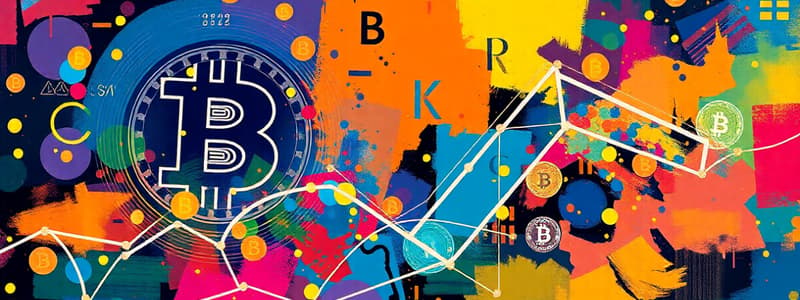Podcast
Questions and Answers
Ownership rights to physical assets on distributed ledger technology are represented by a:
Ownership rights to physical assets on distributed ledger technology are represented by a:
- token. (correct)
- blockchain.
- smart contract.
Which statement best describes how stablecoins maintain a stable value? Stablecoins:
Which statement best describes how stablecoins maintain a stable value? Stablecoins:
- can be exchanged for fiat currency.
- link their value to other assets. (correct)
- have legal and regulatory backing.
Which distributed ledger technology element may include proof of work and proof of stake?
Which distributed ledger technology element may include proof of work and proof of stake?
- Participation network.
- Digital ledger.
- Consensus protocols. (correct)
Investors in an initial coin offering (ICO) typically receive:
Investors in an initial coin offering (ICO) typically receive:
Compared to centralized exchanges, decentralized exchanges are more:
Compared to centralized exchanges, decentralized exchanges are more:
The inherent value of digital assets is least likely to be based on:
The inherent value of digital assets is least likely to be based on:
Potential impacts of asset-backed tokens most likely include:
Potential impacts of asset-backed tokens most likely include:
With regard to the role of digital assets as an investment class, it is most accurate to state that they:
With regard to the role of digital assets as an investment class, it is most accurate to state that they:
Which type of cryptocurrency-related vehicle invests directly in cryptocurrencies?
Which type of cryptocurrency-related vehicle invests directly in cryptocurrencies?
Cryptocurrency prices are least likely to be affected by:
Cryptocurrency prices are least likely to be affected by:
Compared to regulated initial public offerings, initial coin offerings most likely have:
Compared to regulated initial public offerings, initial coin offerings most likely have:
Which of the following statements is most accurate regarding the features of digital assets? Digital assets:
Which of the following statements is most accurate regarding the features of digital assets? Digital assets:
Risks of directly investing in large, well-established cryptocurrencies least likely include:
Risks of directly investing in large, well-established cryptocurrencies least likely include:
A government decides it will privatize vehicle registrations if the province's auto insurance companies can record and maintain ownership titles using distributed ledger technology. This application of distributed ledger technology is best characterized as:
A government decides it will privatize vehicle registrations if the province's auto insurance companies can record and maintain ownership titles using distributed ledger technology. This application of distributed ledger technology is best characterized as:
Flashcards
What do tokens represent?
What do tokens represent?
Tokens represent ownership rights to physical assets on a blockchain or distributed ledger technology.
How do stablecoins maintain value?
How do stablecoins maintain value?
Stablecoins maintain value by linking their value to a collateralized basket of assets.
Which element includes Proof of Work or Stake?
Which element includes Proof of Work or Stake?
Consensus protocols may include proof of work (PoW) and proof of stake (PoS).
What do investors typically receive in an ICO?
What do investors typically receive in an ICO?
Signup and view all the flashcards
Are Decentralized exchanges easy to regulate?
Are Decentralized exchanges easy to regulate?
Signup and view all the flashcards
Digital asset value is LEAST likely based on?
Digital asset value is LEAST likely based on?
Signup and view all the flashcards
Impact of asset-backed tokens?
Impact of asset-backed tokens?
Signup and view all the flashcards
Role of digital assets in portfolios?
Role of digital assets in portfolios?
Signup and view all the flashcards
Which vehicle invests directly in cryptocurrencies?
Which vehicle invests directly in cryptocurrencies?
Signup and view all the flashcards
What LEAST affects crypto prices?
What LEAST affects crypto prices?
Signup and view all the flashcards
How do ICO costs compare?
How do ICO costs compare?
Signup and view all the flashcards
How are digital assets validated?
How are digital assets validated?
Signup and view all the flashcards
Least likely risk?
Least likely risk?
Signup and view all the flashcards
What does tokenization refer to?
What does tokenization refer to?
Signup and view all the flashcards
Study Notes
- Here are the study notes from the provided text
Ownership Rights and Tokens
- Tokens represent ownership rights to physical assets on a blockchain or distributed ledger technology.
- Smart contracts are computer programs that execute contracts based on pre-agreed upon conditions.
Stablecoins
- Stablecoins maintain price stability by linking their value to a collateralized basket of assets.
- Stablecoins are not designed to be exchanged for fiat currency.
- Stablecoins do not have legal and regulatory backing.
Distributed Ledger Technology
- A distributed ledger is a shared copy of a database.
- Consensus mechanisms determine how new entries are added to the ledger.
- The participation network determines who can perform network functions.
- Proof of Work (PoW) and Proof of Stake (PoS) are consensus protocols for adding blocks to the chain.
- PoW requires solving a complex algorithm to validate and add blocks, earning cryptocurrency.
- PoS requires a validator to verify transactions with a majority of validators attesting to the block's validity.
Initial Coin Offering (ICO)
- An ICO is a sale of cryptocurrency to investors.
- In an ICO investors exchange cash or another cryptocurrency for cryptocurrency.
Decentralized Exchanges
- Centralized exchanges are popular but more vulnerable to attacks.
- Decentralized exchanges lack a central control point, making them difficult to regulate.
- Decentralized exchanges can remain operational even if one computer is attacked.
Value of Digital Assets
- The value of digital assets comes from anticipated price appreciation and blockchain features.
- Digital assets do not typically generate cash flow like interest or dividend income.
Asset-Backed Tokens
- Asset-backed tokens represent ownership of physical assets.
- They can provide more liquidity for higher-priced assets by allowing fractional ownership.
- Tokens allow immutable ownership records and more transaction transparency.
Digital Assets as an Investment Class
- It is inconclusive whether digital assets provide diversification benefits.
- They are a new, highly speculative asset class with high volatility and returns but without legal protections.
Cryptocurrency Investment Vehicles
- Cryptocurrency coin trusts directly invest in cryptocurrencies.
- Cryptocurrency ETFs attempt to mimic returns using cash or derivatives.
- Cryptocurrency futures contracts are based on cryptocurrency prices and are cash-settled.
Cryptocurrency Prices
- Cryptocurrency prices are influenced by market adoption, network effects, technological advancement, regulatory development, speculation, and appetite for market risk.
- Cryptocurrency prices are NOT influenced by projected cash flows.
Initial Coin Offerings (ICOs) vs. Initial Public Offerings (IPOs)
- ICOs typically have lower issuance costs compared to regulated IPOs.
- ICOs have longer capital-raising periods.
- ICOs usually do not have voting rights.
Features of Digital Assets
- Transactions for digital assets are usually recorded on permissionless blockchain networks.
- Digital assets are rarely used as a direct medium of exchange due to transaction costs.
- Legal and regulatory frameworks for digital assets are still evolving.
Risks of Investing in Cryptocurrencies
- "Whales" manipulate the price of smaller cryptocurrencies.
- Major risks include fraud (pump and dump schemes, market manipulation, theft) and loss of access (loss of passkey).
Tokenization
- Tokenization maintains ownership records for physical assets on a distributed ledger.
- Blockchain is a subcategory of distributed ledgers.
- Smart contracts are computerized agreements that automatically carry out actions based on defined conditions.
Studying That Suits You
Use AI to generate personalized quizzes and flashcards to suit your learning preferences.




